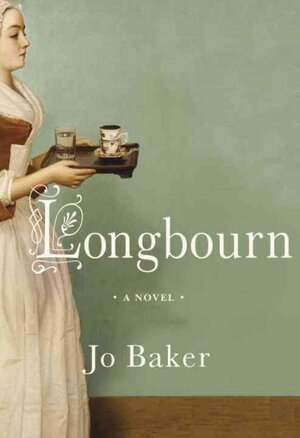Mapped onto Jane Austen's Pride and Prejudice, Jo Baker tells the tale of the Bennet household from the servants' perspective. (See an interesting interview with JoBaker published on NPR.) And a very well told tale it is, with rich characters, gritty description of the hard life of those living at the whim of the "upper classes," and great relationship building. If you were not already aware of how onerous a class system can be in "civilized" society, this novel will certainly bring it home.
Mrs. Hill is the housekeeper, which means she is responsible for everything that happens in the house, from making sure the chamber pots are cleaned, to cooking meals and doing the laundry. Of course, she has help in this work from the industrious Sarah and the mooning and lackadaisical youngster, Polly. Up before the rest of the household, Sara, pumps buckets of water to fill the tubs for laundry day as the story opens. On her way inside, she steps in pig shit, slips and has to start all over--to say nothing of cleaning herself up and coping with the bumps and bruises from her fall. But she is an orphan and will have few prospects for a decent life outside this semi-slavery of being a servant in a good family. Everyday incidents and interactions highlight for the reader how little regard for the consequences of their actions the Bennet family has or how vaguely they seem to see their servants as actual human beings with thoughts and cares and feelings of their own. When the Bennets decide to hire a new footman, the balance of things begins to shift dramatically. Sarah can't decide whether to hate him because he does not give her the time of day, or love him. He certainly makes their lives easier as he takes up much of their work, and eventually Sarah does in fact fall in love with James. Only eventually do we learn that James is Mrs. Hill's illicit son with Mr. Bennet; James was sent off as a day old infant to a farm, and was never seen again by his mother until now. One section of the book tells us of what James has endured before coming to the Bennet's household and how he longs for home, only to have it destroyed by a self-righteous soldier, Mr. Wickham, who inserts himself into the Bennet's lives through the daughters' socializing. There is a short author's note that briefly describes how this book matches up with it's inspiration, but you might never have read Pride and Prejudice and still very much enjoy this period piece.
Mrs. Hill is the housekeeper, which means she is responsible for everything that happens in the house, from making sure the chamber pots are cleaned, to cooking meals and doing the laundry. Of course, she has help in this work from the industrious Sarah and the mooning and lackadaisical youngster, Polly. Up before the rest of the household, Sara, pumps buckets of water to fill the tubs for laundry day as the story opens. On her way inside, she steps in pig shit, slips and has to start all over--to say nothing of cleaning herself up and coping with the bumps and bruises from her fall. But she is an orphan and will have few prospects for a decent life outside this semi-slavery of being a servant in a good family. Everyday incidents and interactions highlight for the reader how little regard for the consequences of their actions the Bennet family has or how vaguely they seem to see their servants as actual human beings with thoughts and cares and feelings of their own. When the Bennets decide to hire a new footman, the balance of things begins to shift dramatically. Sarah can't decide whether to hate him because he does not give her the time of day, or love him. He certainly makes their lives easier as he takes up much of their work, and eventually Sarah does in fact fall in love with James. Only eventually do we learn that James is Mrs. Hill's illicit son with Mr. Bennet; James was sent off as a day old infant to a farm, and was never seen again by his mother until now. One section of the book tells us of what James has endured before coming to the Bennet's household and how he longs for home, only to have it destroyed by a self-righteous soldier, Mr. Wickham, who inserts himself into the Bennet's lives through the daughters' socializing. There is a short author's note that briefly describes how this book matches up with it's inspiration, but you might never have read Pride and Prejudice and still very much enjoy this period piece.

No comments:
Post a Comment